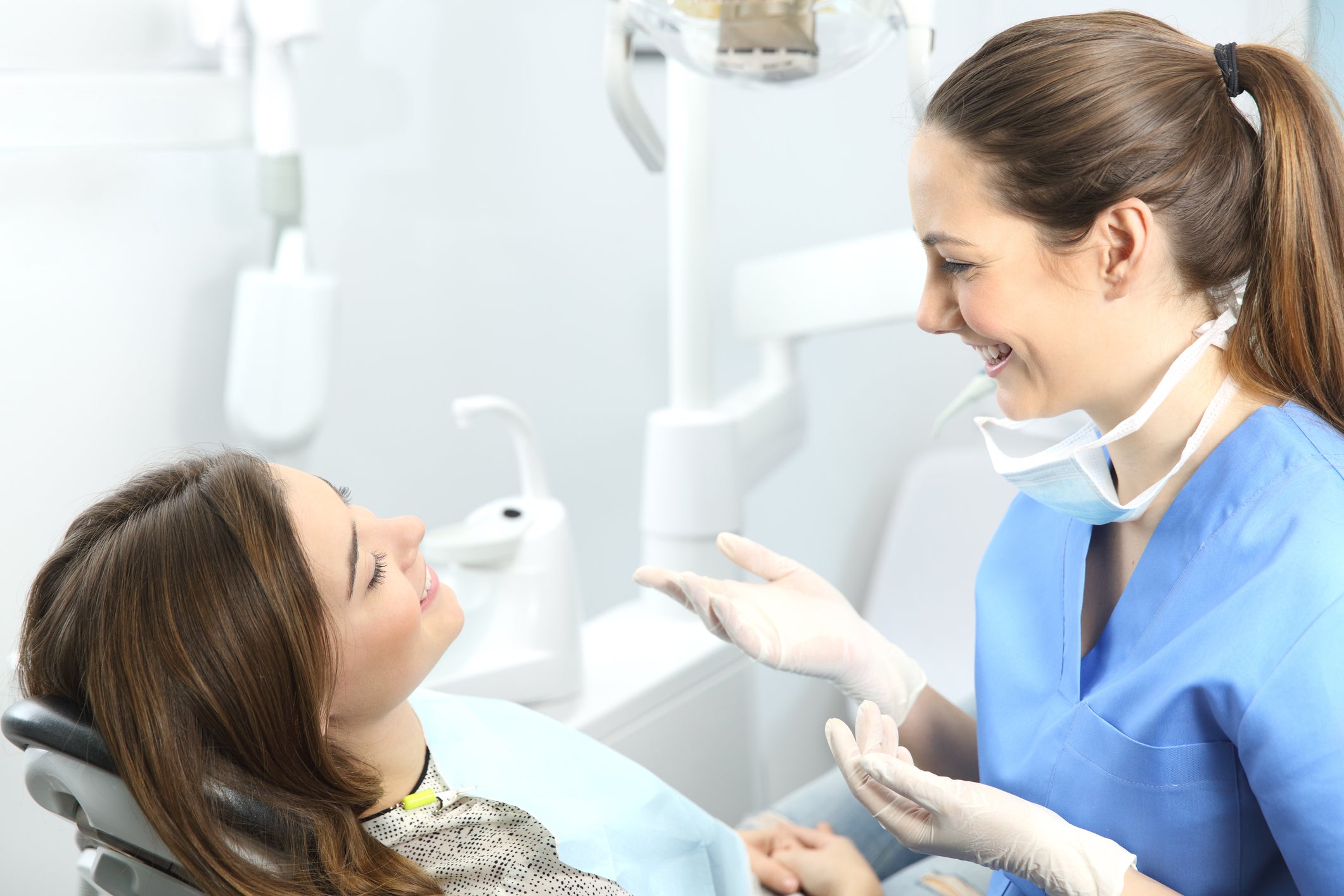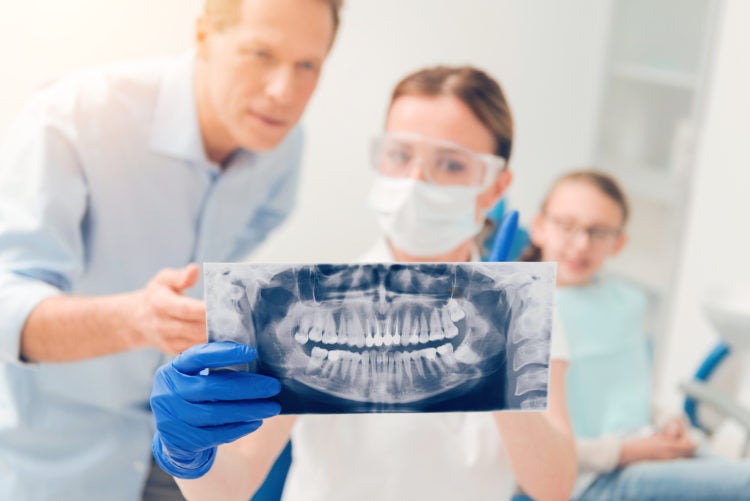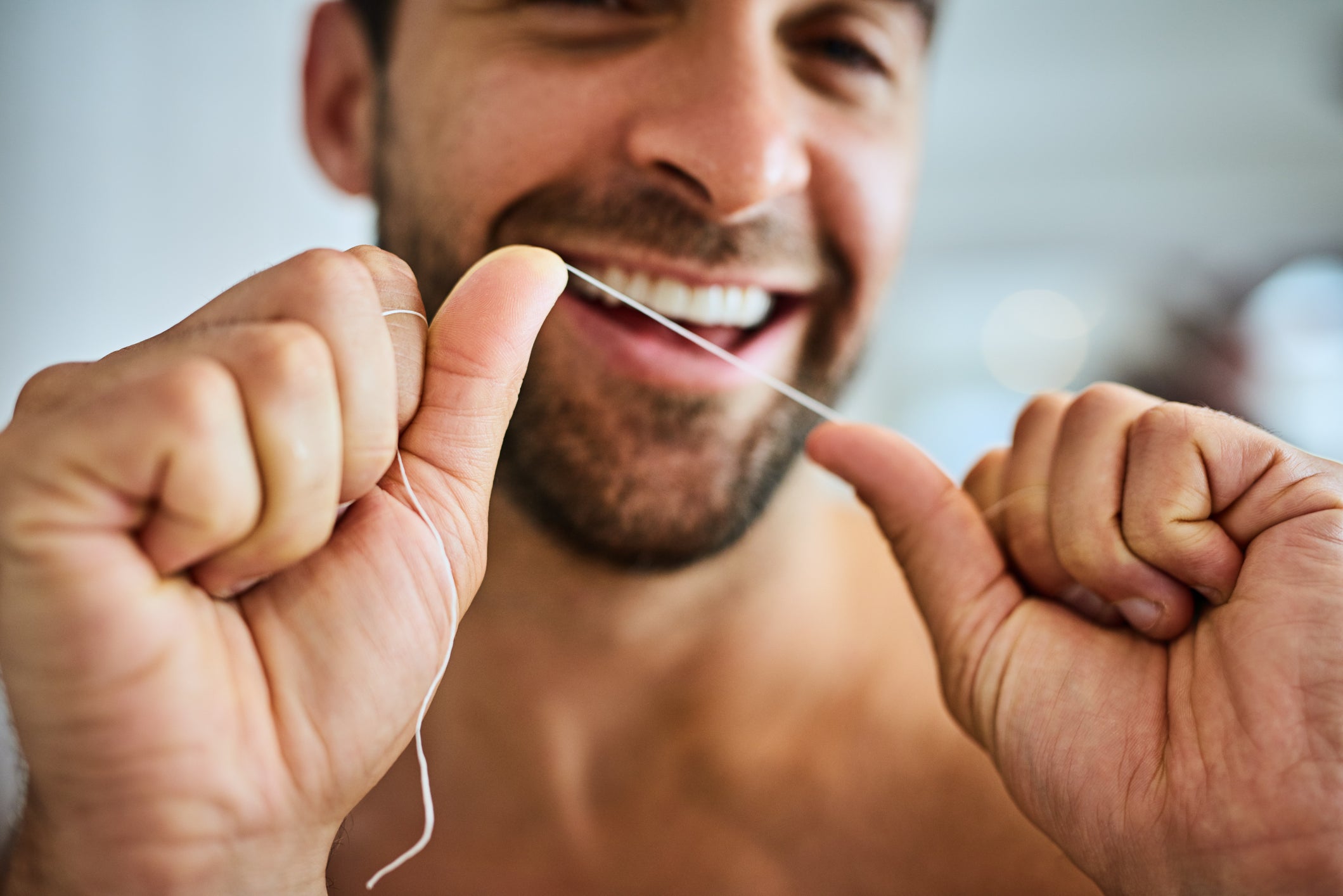-
What Causes Snoring? Solutions for Better Sleep

If your partner snores or your partner has complained that you snore, you may be on the lookout for ways to treat this problem. Occasional snoring is normal and nothing to be concerned about. However, chronic snoring may be a symptom of an underlying health problem that requires treatment.
Causes of Snoring
Periodic snoring may be caused by consuming alcohol close to bedtime, taking sleep aids, or sleeping on your back. Other causes include being overweight or having a deviated nasal septum or narrow airway.
Obstructive sleep apnea (OSA) is another possible reason for chronic snoring. This sleep disorder causes breathing to slow or stop five or more times per hour of sleep. The reduction in breathing signals the body to wake up, which may result in a loud gasping or snorting sound.
People with sleep apnea don’t just disrupt their partner with loud snoring—they also often struggle with fatigue, morning headaches, and difficulty concentrating. Sleep apnea can also cause high blood pressure, increase the risk of stroke, and lead to sexual dysfunction.
Treatments for Sleep Apnea
If you or a loved one snores loudly and struggles with daytime symptoms associated with obstructive sleep apnea, rest assured that solutions are out there! One option commonly recommended by doctors is to use a continuous positive airway pressure (CPAP) machine. While this may be the only effective option for treating severe OSA, patients with mild to moderate sleep apnea may benefit from wearing an oral appliance during sleep.
Oral appliances for sleep apnea resemble mouth guards worn to stop nighttime teeth grinding. The biggest difference is that oral appliances for sleep apnea are designed to hold your bottom jaw forward slightly. This helps prevent your tongue from relaxing and blocking your airway as you sleep.
Benefits of Oral Appliance Therapy
Many patients prefer using a non-obtrusive oral appliance to treat sleep apnea instead of a CPAP machine. Consider the many benefits of this option:
- Comfortable and simple to wear
- Discrete and easy to transport when traveling
- Easy to clean and care for
- Affordable
Get Solutions for Better Sleep from Park 56 Dental
To take full advantage of oral appliance therapy for sleep apnea, you need a custom device made to fit your mouth. The team at Park 56 Dental is happy to meet with you to discuss your snoring concerns. We will perform a series of tests to diagnose your condition and recommend the proper treatment. This may include a custom oral appliance, lifestyle changes, and more.
If we determine that a custom oral appliance can help you, we’ll fabricate one based on an impression of your teeth. This allows the device to fit your mouth without compromise for the best possible outcome.
The “Sleep Better” Team at Park 56 Dental can offer solutions to help you improve your quality of life. Contact us at (212) 826-2322 today to schedule a consultation at our NYC dentist office, and your journey to a more restful sleep will begin!
-
How Often Should You Visit the Dentist?

There haven’t always been guidelines for how often you should visit the dentist. As recently as 50 years ago, many dental professionals focused on restoring smiles rather than keeping them healthy in the first place.
Then, dental and health organizations began to rally around the idea of setting standards for preventative dentistry. It is upon these standards—and the continuing evolution of dental care and advice—that dentists operate today.
Visit the Dentist Every 6 Months
The general rule of thumb is to visit the dentist every six months. This timeframe allows your teeth to benefit from frequent professional cleanings that can prevent gum disease and cavities.
With no evidence to work from, early dental and health organizations made their “best guess” when they recommended that people see the dentist twice a year. The advice ended up being spot on! Some of the first publicized references to this recommendation were found in early Pepsodent ads, such as this one from 1931, which advises customers to “use Pepsodent twice a day—see your dentist twice a year.”
Even if you take great care of your teeth at home—by brushing every morning and night, and never forgetting to floss each day—you still need to see a dentist regularly. First of all, those tartar stains that form on your teeth can only be removed with professional dental tools.
Plus, there’s always the possibility of developing cavities, gum disease, or oral cancer, which don’t exhibit symptoms in their early stages. Frequent visits to the dentist give you a chance to uncover these problems and reverse them while they’re still in a manageable stage.
Consider Oral Hygiene, Eating Habits & Medical Conditions
While seeing the dentist every six months is a good recommendation for most people, it doesn’t apply to everyone. For instance, some individuals with a spotless dental record, flawless oral hygiene, and a healthy diet have a low risk for oral health problems. They may do just fine seeing the dentist only once a year.
Other people have a higher-than-average risk for cavities, gum disease, and oral cancer. We recommend that the following groups visit the dentist more frequently:
- Smokers
- People prone to cavities or plaque buildup
- Periodontal disease patients
- Pregnant women
- Diabetics
- People with bacterial infections or weak immune systems
- People dealing with illness or high stress
These individuals may need to visit the dentist every three or four months for a short time, for several years, or throughout their entire life. More frequent dentist visits help to fight off infections, treat changes in the mouth, and prevent certain situations or lifestyle choices from causing more severe health problems.
Park 56 Dental is ready to serve as your dentist in NYC! At your next appointment, be sure to ask for advice about what dental cleaning schedule you should follow. For answers to your remaining questions, or to schedule a visit, please contact us at (212) 826-2322 today.
-
Caring for Your Braces

If you have invested in braces to straighten your teeth, it’s clear that having a healthy, beautiful smile is important to you. The trouble is that traditional braces make dental hygiene a bit trickier than usual. To help ensure your teeth don’t succumb to cavities while you’re straightening your smile, follow these tips to care for your braces.
Brush with Care
Food particles and plaque tend to accumulate under and around the brackets and wires of your braces. With the following brushing techniques, you can sweep away debris to help keep your mouth clean and cavity-free:
- Remove elastics, bands, and any other removable parts of your braces.
- Clean around the wires and brackets with a soft-bristled toothbrush. Start by holding your toothbrush at a 45-degree angle from the gum line. Then, tilt the bristles as needed to sweep away even the most stubborn particles.
- Brush for two minutes twice a day. Aim to spend 30 seconds in each quadrant of your mouth.
- Rinse with tap water, and examine your teeth and braces in the mirror. Check for any lingering food particles that require a little more attention.
- If you don’t feel like your manual toothbrush is doing a thorough enough job, consider investing in an electric toothbrush. Look for one with a round head and V-shaped bristles designed for use with braces.
Remember to Floss
Flossing once a day is important for everyone, including people with braces. Unfortunately, the wires make it difficult to floss between your teeth along the gum line.
One solution is to use a floss threader. This makes it easier to feed the floss under each wire. We also recommend using waxed floss, which is less likely to get caught and shredded up in your braces. You can also use self-threading floss, which features a stiffened tip that speeds up the process of flossing with braces or permanent retainers.
No matter which method you use, thread the floss carefully under the main wire of your braces before passing it through your teeth. Be careful not to snap the floss—simply move it up and down slowly against each side of the tooth. Then, remove the floss and re-thread it through the next wire. Repeat this process until you have flossed between all your teeth.
Schedule Follow-Up Appointments
Visit your orthodontist for routine checkups and adjustments to your braces. This is what allows your teeth to continue shifting into the ideal position. Also, keep up with regular cleanings and oral exams with your regular dentist to keep your mouth healthy and catch cavities early. You may also receive more useful tips for brushing and flossing with braces.
Traditional braces aren’t right for everyone. If you’re interested in finding out what Invisalign has to offer, please contact Park 56 Dental in NYC at (212) 826-2322. We’ll help you get the beautiful smile you’ve always wanted without metal braces!
-
What You Need to Know About Getting Dentures

Dentists work hard to save their patients’ natural teeth whenever possible. However, if yours are severely damaged or decayed, tooth extractions may be necessary. This is the first step toward restoring the appearance of your smile and making it easier to speak and eat. The next step is to choose a tooth replacement option.
Dentures are a popular choice, especially if you’ve lost all your teeth. Dentures are removable appliances that make your teeth look healthy and function naturally. You can smile, talk, and chew with confidence while wearing properly fitted dentures.
If you’re considering different tooth replacement options, here’s everything you need to know about getting dentures.
Types of Dentures
The most common choice is a conventional denture, which is fully removable and made to replace all your teeth. To prepare for conventional dentures, you will need to have any remaining teeth removed and allow your gums to heal before being fitted, which may take a few months.
Because of the delay in making conventional dentures, you may have the option of inserting immediate dentures the same day your teeth are extracted. This way, you aren’t left without teeth during the healing period.
If possible, your dentist will preserve some of your natural teeth to provide stability for your dentures while reducing the deterioration of your jawbone. In this situation, your dentist may recommend overdentures, which are complete or partial dentures that sit on top of or attach to your remaining natural teeth. The added support makes overdentures less likely to become unstable or require refitting.
Wearing Dentures
For the first few weeks, wearing new dentures may feel awkward. You might experience minor irritation or soreness along with increased saliva flow. These problems should dissipate as you become accustomed to wearing your dentures. If any problems persist, tell your dentist at a follow-up appointment so the necessary adjustments can be made.
Caring for Your Dentures
Good oral care continues to be important, even if your teeth have been replaced with dentures. Here’s what to do:
- Remove your dentures and rinse them with water to dislodge loose food particles.
- Gently brush all surfaces of the dentures with a soft bristle toothbrush and a non-abrasive cleanser.
- Store your dentures in a cup of water when you’re not wearing them to prevent warping.
- Brush your gums, cheeks, tongue, and the roof of your mouth every morning before putting your dentures in to stimulate circulation and remove plaque. Brushing also reduces the risk of oral irritation and bad breath.
- You may choose to apply adhesive to improve the stability of your dentures. Use a product your dentist recommends, and follow the directions carefully for the best results.
Dentures are just one of several options for replacing missing teeth. If you have a gap in your smile, visit Park 56 Dental in NYC today. We’ll discuss whether dentures are right for you and explain any alternatives you’re interested in. Give us a call at (212) 826-2322 to get started!
-
The Importance of Regular Dentist Visits

While brushing and flossing at home every day is a critical part of maintaining a healthy mouth, these steps aren’t enough to keep tooth and gum problems at bay forever. For thorough preventative care and treatment, you need help from a dental professional. Here’s a look at just how important dentist visits are.
Your dentist checks for cavities
To do this, most dentists take X-rays of your teeth. This creates a clear picture of what’s going on in your mouth, even under the gum line. If a cavity is developing, X-rays tell the dentist exactly where it’s located. This way, you can get a filling before the decay spreads and causes more trouble.
Your dentist removes tartar build-up
Every day, a sticky, clear layer of plaque forms on your teeth. You can remove plaque by brushing twice a day. If any is left behind, it hardens into a tooth-staining substance called tartar, or calculus. Only a dentist using special tools can remove tartar from your teeth, a process known as scaling.
Your dentist professionally cleans your teeth
Motored tools and a polishing agent provide a more thorough cleaning than what you can achieve at home. The dentist finishes the job by flossing between your teeth. Your mouth will feel extra clean after all the plaque, tartar, and surface stains have been removed.
Your dentist checks your gums
Healthy gums are just as important as healthy teeth. During your visit, the dentist will use a periodontal probe to measure the space between your teeth and gums. Shallow pockets indicate healthy gums, while deep spaces could mean you have gum disease. Catching this condition in its earliest stage, known as gingivitis, gives you a chance to reverse it. However, if you skip too many dentist visits, your condition could progress to periodontal disease, which can only be maintained or cured with pocket reduction surgery.
Your dentist checks for oral cancer
A careful examination of your tongue, throat, neck, and the inside of your cheeks can reveal swelling, redness, or signs of cancer. Receiving an early diagnosis offers the best chance of making a full recovery, which you can only do if you visit the dentist regularly.
Your dentist provides personalized advice to help you take care of your smile
If you struggle with poor gum health or teeth that stain easily, your dentist can recommend specific products or procedures that may help. Implementing this personalized, expert advice can help you keep your teeth and gums healthy between dentist visits.
Clearly, there are some things you can’t do without your dentist’s help. We recommend visiting Park 56 Dental in NYC at least once every six months for the important dental services you need. Our experienced dentists will take good care of your smile! To learn more about our services, or to schedule an appointment, please call us at (212) 826-2322 today.
-
Gum Disease Prevention Tips

When you think of a healthy smile, you may picture straight, white teeth, but your gums are just as important. Even if you don’t have cavities, your teeth could be in jeopardy if you develop gum disease. This condition occurs when plaque starts to form along and under the gum line. If not removed with daily brushing and flossing, this sticky substance can harden into tartar, irritating your gums and causing an infection. This leads to gingivitis, the first stage of gum disease.
Since gingivitis is usually painless, most people don’t even know they have it. If left untreated, it can progress to a more advanced stage called periodontitis. This chronic condition affects a whopping 47 percent of American adults over age 30. Without professional care, periodontitis can lead to tissue and bone loss, eventually causing your teeth to loosen and fall out.
Don’t let this happen to you! Follow these gum disease prevention tips to maintain healthy gums and protect your smile.
Brush twice a day
Brushing with fluoride toothpaste is a fundamental way to remove plaque and food particles from your teeth that can irritate your gums. Select a soft bristle toothbrush, and avoid scrubbing too hard since this can erode tooth enamel and cause receding gums. Try an electric toothbrush for even more effective plaque removal.
Don’t just brush—floss!
Even an electric toothbrush can’t sweep away particles and plaque from between your teeth. That’s why flossing is so important. Even if your gums bleed, don’t shy away from this part of your oral care routine—bleeding is a sign that your gums are weak. Flossing more often provides the stimulation they need to help make them stronger.
Use gingivitis-fighting mouthwash
Shop for mouthwash products that reduce plaque, slow tartar formation, fight gingivitis, or all three. Remember, mouthwash isn’t a substitute for brushing and flossing—it should come after these steps to maximize the benefits they offer.
Quit smoking
Looking for another reason to quit the habit? Smoking is closely linked to the onset of gum disease and other oral problems. Since nicotine, tar, and other chemicals in cigarettes weaken your immune system, your body has a harder time fighting off a gum infection. Plus, your gums can’t heal as easily once they’re damaged, making gum disease treatment less effective.
Visit the dentist every six months
Since gum disease is so prevalent and quick-forming, children and adults of all ages are encouraged to visit the dentist for an oral exam and professional cleaning every six months. A process called scaling is the only way to remove tartar build-up, a key aspect of gum disease prevention. Your dentist can also check for cavities, polish your teeth, recommend dental care products, and leave you with a brighter, more confident smile.
The services at Park 56 Dental can help you prevent and treat gum disease in NYC. For more dental care tips, or to schedule an appointment with our dentist, please contact us at (212) 826-2322.
-
Answers to Common Questions About Invisalign

If you want to straighten your teeth, you will be pleased to learn that there’s an alternative to brackets and wires called Invisalign. This treatment uses a series of virtually invisible aligners to gradually shift your teeth into the desired position. Learn more about Invisalign to see if this is the solution you’ve been looking for.
How does Invisalign work?
Invisalign aligners are made using 3D computer imaging technology. You wear each upper and lower aligner for about two weeks, removing them only to eat, drink, brush, and floss. Each new set of aligners shifts your teeth ever so slightly until, by the end of your treatment, they have moved into their final straight position. Most patients need between 18 and 30 aligners for a total treatment time of nine to 15 months.
How much does Invisalign cost?
In most cases, the cost of Invisalign is comparable to traditional braces. The total cost depends on your insurance coverage and the complexity of your case. Many dentists offer flexible financing options to help make your dream of having straight teeth a reality. You can also use money from a Flexible Spending Account (FSA) or Health Savings Account (HSA) to pay for Invisalign with tax-free dollars.
Why should I put my confidence in Invisalign?
Since Invisalign was first invented in 1997, over six million people worldwide have used this technology to straighten their teeth. Advancements to the Invisalign system, including the introduction of the patented SmartTrack material, allow treatment times to be up to 50 percent faster than other clear aligner treatments. SmartTrack is made from medical-grade, high molecular weight, thermoplastic polymers that are BPA-free and FDA-approved.
How will Invisalign affect my life and appearance?
Because the aligners are virtually invisible, most people won’t even notice you’re undergoing treatment—that is, until you reveal your new smile in a few months! Until then, you’ll enjoy the freedom of removing your aligners at suitable times. This allows you to eat and drink whatever you want, brush and floss like normal, chew gum, play woodwind instruments without added difficulty, and smile with complete confidence at weddings, in photos, or during job interviews. Just remember to wear your aligners for at least 20 to 22 hours a day to avoid delays in your treatment.
How do I clean my aligners?
The Invisalign Cleaning System is the best option for keeping your aligners clean. You can order this online or from your dentist. An alternative is to brush your aligners with a toothbrush and toothpaste. You will also need to brush your teeth after every meal before putting your Invisalign back in. Otherwise, your teeth could become stained by residual food trapped under the aligners.
If you still have questions about Invisalign, Park 56 Dental in NYC can answer them for you. We are a Certified Invisalign Provider with years of experience fitting our patients with this advanced tooth-straightening product. To schedule an Invisalign consultation in New York, please contact us today at (212) 826-2322.
-
Wisdom Teeth: What You Need to Know

They say that with age comes wisdom. They may not say this as often, but with age also comes wisdom teeth. This is the last big developmental milestone your mouth undergoes as childhood comes to an end.
Wisdom teeth usually appear between ages 17 and 21. They are your third row of molars evolutionarily designed to replace any teeth you may have lost by now. Thankfully, because of modern dentistry and oral hygiene, you probably still have all of your adult teeth at this age. As a result, there may be no room to allow your wisdom teeth to grow in naturally.
If you’re in your late teens or early 20s, here’s what you need to know about wisdom teeth to help you make the right choice for your oral health.
Why are Wisdom Teeth So Often Removed?
When they grow in properly, healthy wisdom teeth can be beneficial, helping you chew and filling in your jaw with a final row of teeth. However, if the jaw is too small, or the wisdom teeth don’t grow in straight, they may need to be removed. Scenarios like these are incredibly common, meaning that more likely than not, you will need to have your wisdom teeth extracted.
Here are some of the problems your dentist looks for as he or she monitors the growth of your wisdom teeth:
- Impacted wisdom teeth, which are trapped in the jaw or under the gums and can cause a harmful cyst to develop
- Improperly positioned wisdom teeth, which can allow food to become trapped and flossing to be difficult
- Partially erupted wisdom teeth, which give bacteria a place to enter the gums and cause an infection to develop
- No room for wisdom teeth to come through without overcrowding or damaging the surrounding teeth
When to Have Your Wisdom Teeth Removed
Everyone is unique, but your dentist may recommend extracting your third molars in these situations:
- As a preventative measure if your mouth appears too small
- As part of your oral health plan, such as before getting braces
- If X-rays reveal impacted wisdom teeth
- If you experience pain, cysts, tumors, damaged teeth, or gum disease
Is it Possible to Keep Your Wisdom Teeth?
If it’s not immediately necessary to remove your third molars, you may choose to let them continue developing. Your dentist will recommend monitoring them regularly because of the possible problems that can occur later. Be sure to floss around your wisdom teeth, including behind them, and visit your dentist at least every six months.
Park 56 Dental offers compassionate, high-quality dentistry in NYC. We know you might be anxious about having your wisdom teeth extracted. That’s why we make sedation dentistry available to our patients. We’ll work closely with you to determine whether nitrous oxide (laughing gas), oral sedation, or IV sedation is the best option.
Please contact us today at (212) 826-2322 to schedule a wisdom tooth extraction consultation at our New York office.
-
Why Flossing is Important to Your Dental Health

While seven out of 10 Americans brush their teeth at least twice a day—the amount recommended by the American Dental Association—only 30 percent of the population flosses every day. This makes it clear that people prioritize brushing, but they’re more inclined to write off flossing. Here’s why you shouldn’t skip this important part of your oral care routine.
Flossing Removes Plaque
Plaque is a soft, sticky substance that forms on your teeth after you eat. Within just a few hours, it starts to solidify into tartar, a hard substance that forms along the gum line. Skipping a few days of flossing gives plaque all the time it needs to stick firmly to your teeth. By then, the dark-colored tartar can only be removed by a dentist using special tooth-scraping tools.
Thanks to floss, you can get into hard-to-reach places between the teeth and under the gum line, scraping away plaque before it hardens into cavity-causing, tooth-staining tartar!
Flossing Promotes Healthy Gums
Perhaps you intentionally avoid flossing because it makes your gums bleed. It may seem counterintuitive, but flossing actually strengthens your gums to reduce bleeding.
Scraping plaque out from below the gum line also helps prevent gingivitis, an infection characterized by red, swollen gums. Gingivitis is the first stage of gum disease, or periodontal disease, which can lead to tooth loss if it’s left untreated for long enough.
Flossing Makes Your Whole Body Healthier
Cavities and gum disease affect other parts of your body more than you might realize. The bacteria that thrive in an unhealthy mouth can lead to heart disease, respiratory illness, and diabetes. It could even increase your risk of having a stroke.
Therefore, just a few minutes of flossing each day with a low-cost product could have incredibly beneficial implications for your overall health.
Flossing Fights Cavities
A cavity can develop anywhere tooth decay occurs, including in between two teeth and under the gum line. Prevent bacteria from building up here with the simple act of flossing. It could save you the discomfort and cost of a root canal!
Proper Flossing Technique
If you use traditional floss, wrap the ends of an 18-inch piece around your forefingers, and gently slide it between each tooth. Curve around one tooth, and then the other, rubbing up and down to scrape away floss and stimulate the gums. Avoid a sawing motion, which can harm your gums. If traditional floss is uncomfortable, you can also use floss picks or a water flosser.
Clearly, flossing is a simple step you can take to keep your mouth healthier. Of course, it can’t replace professional dental cleanings, which should take place every six months or as recommended by your dentist. Park 56 Dental is here to help you take good care of your smile. We provide general dentistry as well as smile restoration services. Visit us for the dental care you need today!
For more dental health tips, or to schedule an appointment, please contact us at (212) 826-2322.
-
Summer Dental Care Tips

You might have a carefree attitude this summer, but don’t let the family vacations and time off of school negatively impact your teeth. Instead, keep your smile beautiful with these summer dental care tips.
Drink More Water
Instead of reaching for sugary, acidic soda when you’re thirsty, make the right choice for your dental health and choose water instead. Drinking water washes away food particles and plaque-causing bacteria that can lead to cavities and bad breath. Tap water, in particular, promotes a brighter smile because it contains fluoride to strengthen your enamel.
Plus, staying hydrated reduces your risk of dry mouth. With adequate saliva production, your teeth benefit from a slippery, protective coating that prevents debris from clinging and acids from eating away at your enamel.
Drink Acidic Beverages Through a Straw
When you do indulge in soda, juice, or lemonade, use a straw to reduce contact with your teeth. Enjoy the taste of your drink, but don’t swirl it around your mouth. After all, you want to limit the amount of time acid and sugar linger on your teeth.
Sip on Tea
Green tea is full of antioxidants that promote good health. It can even suppress bacteria growth, slow down tooth decay, and help prevent gum disease. Drink tea to your heart’s content, but don’t forget to rinse your mouth out afterward. This is because, despite its benefits, tea can leave surface stains on your teeth. Your dentist can remove these, but it’s easiest to prevent them if you can by swishing with water after each cup of tea.
Eat the Right Snacks
It’s fun to chew on gummy candy, sip on sports drinks, and snack on starchy crackers and pretzels, but these goodies don’t do your teeth any favors. Smarter snacks include raw fruits and vegetables, low-fat dairy products, and crunchy nuts and seeds. These tasty, nutritious snacks fill you up, fuel your summer activities, and help you maintain a healthy smile. Chewing on sugar-free gum after a meal or snack can also help remove food particles and prevent cavities.
Schedule a Dental Checkup
If it’s been six months since your last trip to the dentist, this summer is the perfect time to schedule a checkup. Fit it your appointment before your upcoming vacation, if possible, to reduce the chance of a dental emergency while you’re out of town. A dentist appointment is also beneficial before the school year starts this fall. Get any cavities taken care of before the hectic back-to-school season begins!
The experienced NYC dentists at Park 56 Dental are prepared to offer personalized, quality dental care for you and your kids in a comfortable, spa-like environment. We’ll help you smile bigger and brighter this summer as you enjoy making memories with your family!
To learn more about us, or to schedule a visit, please contact us at (212) 826-2322. If you’re new to our office, we’ll provide a consultation to ensure we can meet your dental care needs.
RECENT POSTS
categories
- Uncategorized
- Cosmetic Dentistry
- Veneers
- Healthier Teeth
- Teeth Whitening
- Dental Health
- Video
- Dental Emergencies
- Invisalign
- Dental Implants
- Root Canal
- Sedation Dentistry
- Infographic
- Dental Crowns and Bridges
- Dental Anxiety
- Gum Disease
- COVID-19
- Bad Breath
- New York Dentist
- Cut out sugar
- General Dentistry
- Oral Health
- Oral Cancer
- Dry Mouth
- Gum Health
- Toothache
- Dental Sealants
- Cavities
